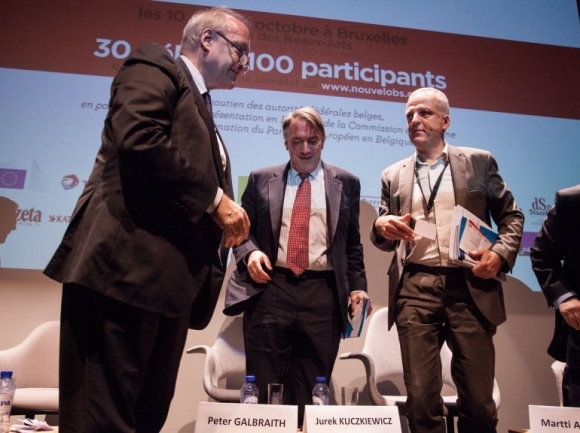The best way to pass the difficult reforms that many EU countries need is to install a grand coalition such as the one that helped save Italy from economic disaster, former Italian Prime Minister Mario Monti said at a public event on Friday (11 October, 2013).
On 21 December 2012 Mario Monti resigned as prime minister due to the withdrawal of coalition endorsement from the center-right People of Freedom party.
Left-wing Italian politicians are divided over Monti’s legacy. Critics say anti-European feelings are a direct consequence of Monti’s austerity reforms. Under Monti, Italy accepted several austerity packages, including hikes on VAT and economic restructuring and a property tax.
Monti has defended his actions, saying Italy was forced into austerity measures due to its bad public finances and increasingly irreparable debt problems.
Monti said the biggest problem facing European democracy was what he called “short-termism”, the fact that politicians were focused on their performance at the next election rather than on finding solutions to their country’s or society’s problems.
Monti was speaking at a conference organised by French magazine Le Nouvel Observateur and other media at the Brussels Centre for Fine Arts, Bozar.
Monti argued that while the EU as a whole had a relatively good level of democracy, rampant inequality in income distribution and other factors made the picture less positive when broken down on the national level. The Union did not try enough to compensate for the weaknesses of the individual member states, he added.
“We have to invent a system which continues to be democratic, depending on elections, but where, maybe, those who govern, care a little bit more about the politics of their government than being re-elected,” Monti said.
‘Treaty change is psycho-drama’
The former Italian prime minister, who served as a European commissioner from 1995 to 2004 and who belongs to various European think tanks, such as the federalist Spinelli group, said he did not advocate a change of treaty or the institutions, which was “always a psycho-drama”. Instead, he called for difficult reforms to be implemented at the national level.
“Simply we need politicians to assume more responsibility. We are never going to be able [to tackle] the youth unemployment problem for example, which is dramatic, if we don’t change our labour market laws, so as to grant a bit less protection to the insiders, to those employed, and more ability to enter for outsiders, who normally are the youth,” he said.
Monti said difficult reforms could not pass because of opposition from the trade unions. He did not name France, where the powerful trade unions strongly oppose giving up on any social rights, but gave as an example his own country and his experience as prime minister. Monti, who keeps a distance from politics, despite having once attended a summit of the centre-right European people’s Party (EPP), formed a technocratic government in November 2011 with the support of the Italian centre-left.
“This is why I’m convinced that we need at the national level, in many of our countries, some sort of grand coalition. I would have never been able in Italy to have a very thorough pension reform, the introduction of property taxes and the big steps against tax evasion if I didn’t have at the same time the support of the right and of the left. The left did not like the pension reform, but it’s not the only political force we penalised in terms of political consensus, because the right didn’t like the other things,” he said.
Monti resigned in December 2012, having passed several reforms and the 2012 budget, saying that he would remain in office only if a new election was held. The election took place in February 2013, but Monti’s centrist coalition was only able to come fourth.
But Monti appeared unperturbed, saying that the current government of centre-left Prime Minister Enrico Letta had his group’s full support.
The echoes of Monti’s plea for grand coalitions may be felt in Germany, where Angela Merkel’s centre-right Christian Democratic Union (along with its Bavarian sister party the Christian Social Union) may enter into a coalition with the centre-left Social Democratic Party.
France has no tradition of grand coalition governments, but the centre-left and centre-right have often joined forces to prevent candidates from the far-right Front National being elected to parliament or at local level.
US ‘similar problems’
Monti also argued that in spite of the prevailing stereotypes that the European Union was lagging behind from the United States in terms of federal institutions, the EU system of economic governance was better than American one.
“We often speak of the USA as a model for the EU, but when we speak of governance of the economy, I think we have better institutions than they have. The presidential power of the man sitting in the White House is not much stronger than the power we have here, [despite] the complexity of 28 member states,” he stressed.
“Is the [US president] able to put under control the federal finances, or is he able to exercise control in foreign trade policies? No, he has a Congress with two parties, the number is much smaller than 28 member states, but the problems are similar,” Monti said.
“You have created the euro without a fiscal and economic union, you have established Schengen without having a common immigration policy and you have put in place an External Action Service without having achieved a unity of purpose,” Galbraith said.
